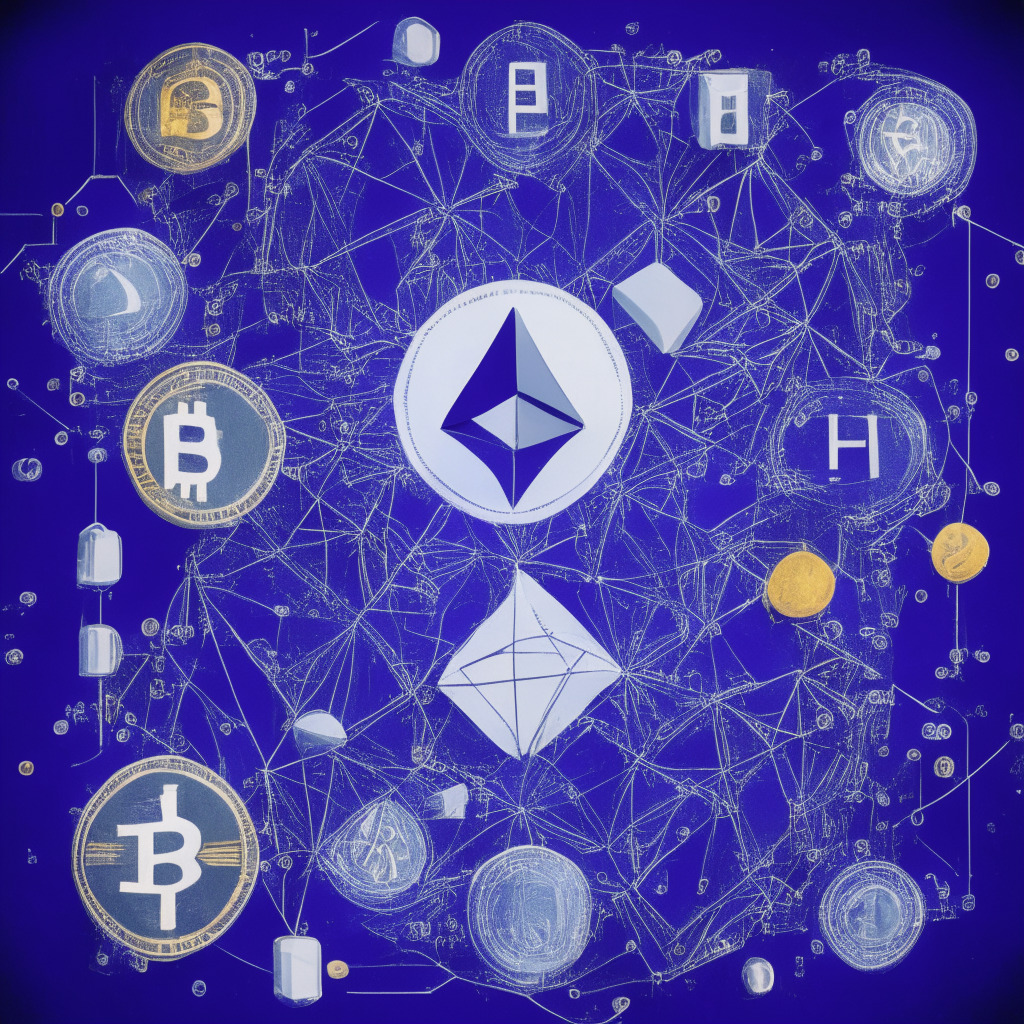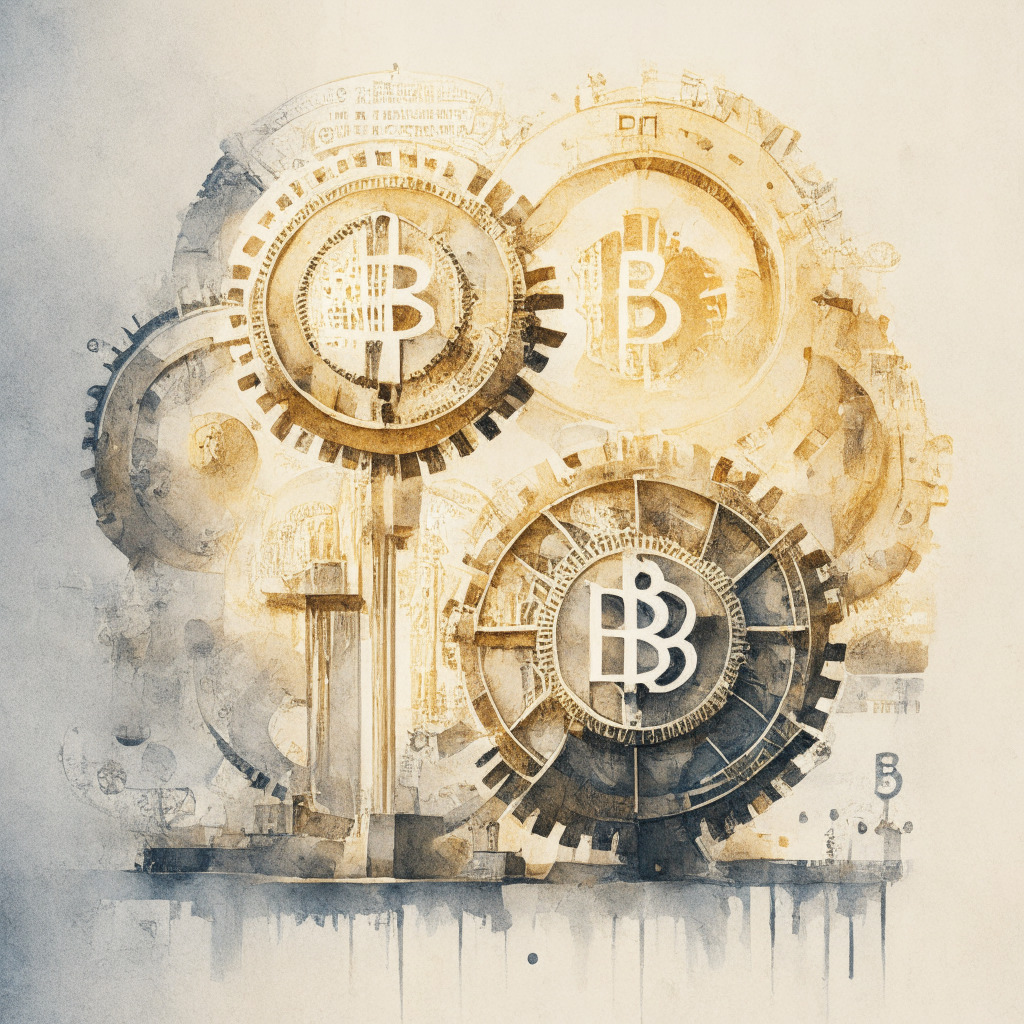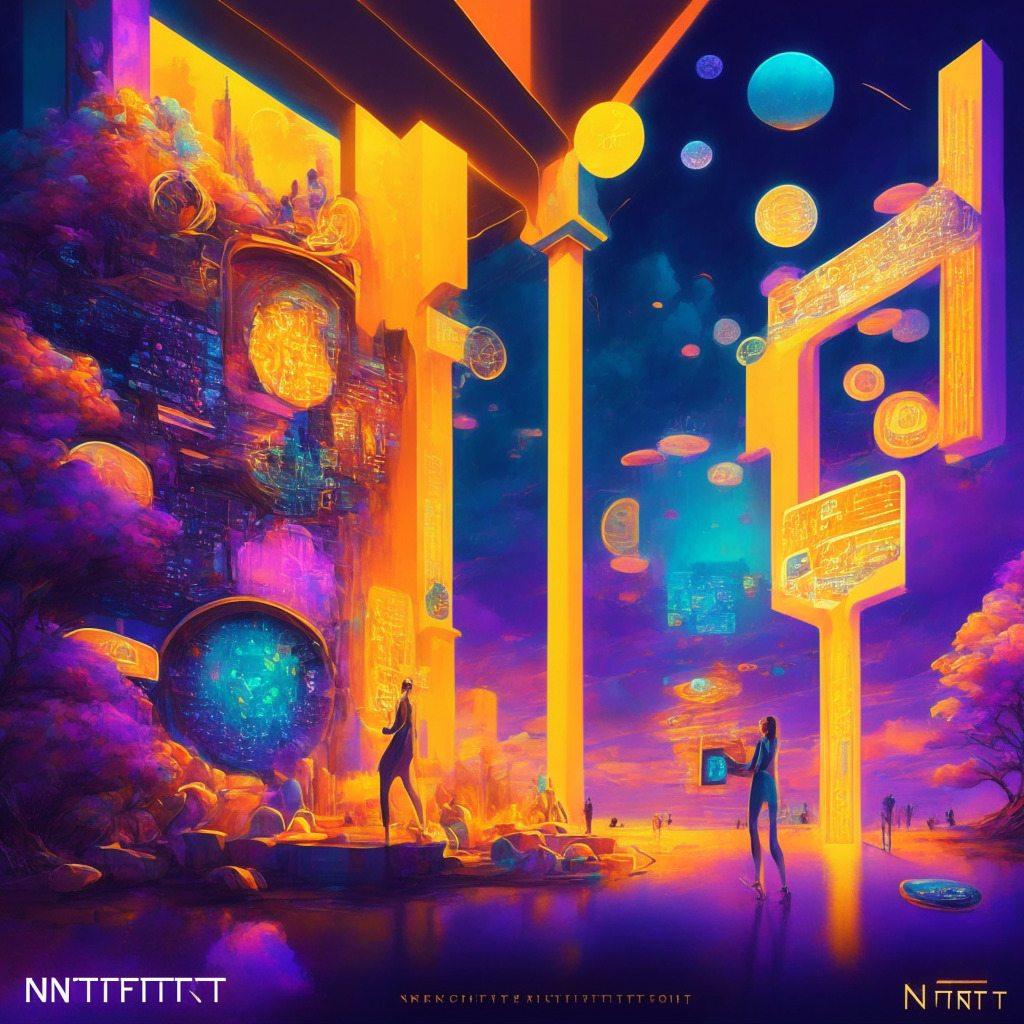Tether reduced counterparty risk by withdrawing $4.5 billion from banks, reinforcing its USDT stablecoin, while Ripple scored a victory against the SEC in their legal dispute. Simultaneously, security concerns arise as Ledger launches its recovery service for lost seed phrases.
Search Results for: Wall
Bitcoin Ordinals Boom: Surging Fees, Growing Popularity, and Unfolding Debate
The total network fees paid for Bitcoin Ordinal minting reached 1,414 BTC ($38.2 million) on May 20, a 700% increase from April 20. Bitcoin Ordinals, developed by cross-chain wallet BitKeep, assign unique numbers to Satoshis, enabling one-of-a-kind digital assets using Bitcoin. However, this approach comes with challenges and limitations, raising concerns over Bitcoin’s evolution and long-term impact on the blockchain ecosystem.
Mordinals: NFTs on Monero Blockchain – Risks, Privacy Concerns & Future Prospects
The rise of Mordinals, nonfungible tokens (NFTs) on the Monero blockchain, has sparked concerns within the Monero community about potential risks to privacy, decentralization, and illegal usage. Despite these concerns, proper interventions and approaches can maintain user privacy while allowing NFTs to thrive on Monero without compromising its core principles.
PSYOP Token’s 1000% Surge: Legitimate Investment or Scam Controversy?
The PSYOP Token’s recent 1,000% surge raises legitimacy concerns, with backlash against creator Ben.eth. Despite controversy, it will be listed on Binance, potentially boosting value. Alternative meme coins Copium, Sponge, and AiDoge show great potential and investor caution is advised.
Ledger Recover: Revolutionizing Seed Backup or Security Risk in Disguise?
Ledger introduced a seed phrase backup product called Ledger Recover, potentially creating a security risk by introducing a third party as a single point of failure. Concerns arise regarding access to users’ private keys with hardware updates and open-source solutions are suggested to improve trustworthiness.
Ethereum Self-Custody Solutions Surge: Casa Controversy and the Future of Crypto Security
The demand for Ethereum self-custody solutions is growing, driving companies like Bitcoin wallet provider Casa to offer Ethereum support. Casa aims to simplify self-custody by incorporating best security practices, making it more enticing for users to control their crypto assets instead of relying on centralized exchanges, thus enhancing security.
Visa Explores Ethereum’s Goerli Testnet for Transaction-Free Payments: Pros, Cons & Conflict
Visa has been utilizing Ethereum’s Goerli testnet and a smart contract called Paymaster to explore transaction-free payments in digital currencies. This method enables users to pay gas fees with any token, eliminating the need for Ether and potentially enhancing payment experiences in the crypto space.
Unveiling Web5: Dorsey’s Decentralized Revolution and Challenges Ahead
Jack Dorsey’s TBD unveils Web5 decentralized web platform, aiming to bring decentralized identity and data storage to applications. Supporting decentralized web apps, the platform utilizes internationally recognized identifiers to eliminate centralized entities, empowering developers and users in the decentralized web landscape.
Inferno Drainer & Scams-as-Services: The Urgency for a More Secure Blockchain Future
The blockchain community faces a new scam as a service called “Inferno Drainer,” which has reportedly stolen nearly $6 million from crypto users. This incident underscores the need for increased security, vigilance, and collaboration within the blockchain and cryptocurrency sectors.
Axie Infinity App Store Debut, NFT Trends, and AI Regulation: Debating Blockchain’s Future
This week’s blockchain news covers Axie Infinity’s App Store launch and a fluctuating NFT trading volume, highlighting the triumphs and challenges in this growing ecosystem. As crypto projects make headlines, staying informed on developments is essential for enthusiasts, traders, and investors.
Bitcoin Reacts to Fed Chair Powell’s Remarks: Understanding Crypto’s Sensitivity to Policy Shifts
Bitcoin’s price approached $27,000 as Federal Reserve Chair Jerome Powell delivered remarks on policy, impacting both traditional finance and crypto markets. The increasing interconnectedness of these worlds underscores the importance of understanding potential policy decision outcomes for both crypto enthusiasts and skeptics alike.
Navigating SEC’s Proposed Custody Rule Changes: Impact on Digital Asset Management
The SEC’s proposed changes to Custody Rule 206(4)-2 could make it more challenging for advisors to manage digital and crypto assets. The rule narrows the scope of “qualified custodians” for digital assets, potentially causing skepticism within the advisory community and impacting client-investor relationships.
Revolut’s License Woes & ASX Ditches Blockchain: Debating Innovation vs Stability
The Bank of England may reject Revolut’s banking license due to balance sheet concerns, while ASX Ltd opts for a conventional technology for its software overhaul instead of blockchain. HashKey Group plans to raise funds at a $1 billion valuation, and Grayscale exploits a potential loophole with a new Bitcoin ETF filing. Ledger’s controversial service launch is deemed a PR failure, and Bit Digital moves operations to Iceland for regulatory risk mitigation. Researchers suggest CBDC systems can be used for cross-border payments, and Switzerland’s canton of Zug raises the limit for tax payments in BTC and ETH.
Ledger’s Controversial Update: Analyzing Risks and Exploring Hoskinson’s Security Insights
Ledger faces scrutiny over a firmware update allowing seed phrase backups through encrypted key fragment transmission. Charles Hoskinson emphasizes the need for open-source, audited software, simplicity, and decentralized updates to enhance hardware wallet security, without breaking customer trust.
Coin Cafe’s $4.3M Repayment: A Call for Better Crypto Regulation or Stifling Innovation?
The recent Coin Cafe case, where the New York Attorney General secured a $4.3 million repayment for undisclosed fees, emphasizes the growing need for better crypto regulation. Striking a balance between investor protection and enabling innovation is crucial for the future development of cryptocurrencies and blockchain technology.
Paraspace NFT Drama: Unraveling Trust, Accountability, and Crypto Mismanagement
The Paraspace NFT protocol saga, involving the resignation of co-founder Jay Yao amid accusations of mismanagement of 2,909 Ether ($5.4 million), highlights potential pitfalls in cryptocurrency management and raises questions about trust and accountability within the blockchain community.
Ledger’s Recover Service Controversy: Unveiling Trust Issues and Understanding Security Models
Ledger faced backlash after launching its Recover service, a subscription offering that splits a user’s recovery phrase into three encrypted components. Concerns emerged over sensitive information security, trust in centralized entities, and possible backdoors. Ledger co-founder Éric Larchevêque called it a “total PR failure,” urging users to understand the complexities of the security model.
Ethereum’s Gradual Rise vs. Alternate Crypto Investments: Analyzing Market Prospects
Ethereum’s price experiences minor fluctuations, but its long-term trajectory appears promising due to strong fundamentals and increased adoption. ETH’s recent growth and potential recovery suggest gradual gains in the market. Major institutions are trialing Ethereum-based applications, contributing to its increasing demand and price potential.
Apple and Others Ban ChatGPT: Balancing AI Innovation and Data Security Concerns
Apple recently restricted the use of ChatGPT and other AI tools, fearing potential exposure of sensitive data. Other major companies like Samsung, JPMorgan, and Goldman Sachs have also prohibited internal use of generative AI, while simultaneously developing their own applications.
Exploring Bitcoin-Based NFTs: DIBA Marketplace, RGB Smart Contracts, and the Future of Digital Assets
DIBA, a new marketplace for exchanging Bitcoin-based non-fungible tokens (NFTs), offers trading on layer 2 networks like the Lightning Network. Using “Really Good for Bitcoin” (RGB) smart contracts, DIBA aims to enable cheaper, more private transactions and simplify token issuance on Bitcoin.
Bitboy, Beeple & the Bizarre BEN Token Saga: Lessons in Crypto Caution and Debate
Crypto influencer Bitboy paid $430,000 for a 20% stake in the Ethereum-based BEN token, sparking criticism and skepticism. Bitboy’s controversial actions and digital artist Beeple’s mocking response highlight the unpredictable nature of the crypto market and the need for caution, due diligence, and skepticism in unproven investments.
Ledger Recover: A Reckless Security Risk or Innovative Seed Phrase Solution?
Ledger’s latest update, Ledger Recover, allows users to opt-in to recover private seed phrases with encrypted portions sent to third parties. Critics argue security risks while Ledger claims it improves traditional storage practices. The crypto community should focus on facts when assessing security innovations.
eNaira’s First Year: Adoption Challenges, Competition with MMOs, and Remittance Solutions
Nigeria’s eNaira marks its first anniversary, with the IMF examining its performance and highlighting areas for improvement. Although praised as the second central bank digital currency (CBDC), slow adoption rates and delayed goals pose challenges. The IMF suggests innovative strategies and leveraging existing market networks to promote adoption and address remittance limitations.
Litecoin’s Future Prospects: Halving Event, Adoption, and Diversification Strategies
Litecoin experiences a dip along with the broader cryptocurrency market, but analysts remain optimistic about its future prospects. Factors such as the upcoming halving event, progress in adoption, and rising transaction count drive Litecoin’s recent success. Investors are accumulating Litecoin ahead of the halving event, and a near-term return to $100+ levels may be possible.
Mexico Embraces Bitcoin Lightning Payments: Analyzing Potential Impact and Challenges
Mexico’s top internet service provider, Total Play, integrated Bitcoin Lightning payments, increasing transaction speed and efficiency. This significant step towards complete institutional adoption of cryptocurrency allows Mexican users to pay internet bills with BTC via Total Play’s Lightning-based payments.
Coin Cafe’s Hidden Fees Debacle: Balancing Crypto Regulation and Industry Growth
New York Attorney General Letitia James secured $4.3 million from Coin Cafe, a Brooklyn-based digital currency service provider, for charging undisclosed, exorbitant fees for its “free” wallet storage services. This case highlights the importance of effective regulation in ensuring investor safety and combating deceptive marketing practices in the growing cryptocurrency industry.
Play-to-Earn Gaming: Revolutionizing the Industry or Diluting its Essence?
“Play-to-earn” games, integrating blockchain and cryptocurrencies, allow players to earn real-world value, revolutionizing the gaming industry. However, concerns include overshadowing genuine gaming experiences, and complexities in navigating blockchain technology. The coexistence of monetary incentives and pure gaming enjoyment remains a debate.
Bitcoin Milestone: 1 Million Wholecoiners, Hyperbitcoinization or Bubble?
Bitcoin enthusiasts celebrate over one million addresses holding at least 1 BTC, a trend that has seen steady growth since mid-2021. Experts like Adam Back argue that “hyperbitcoinization” is coming, but concerns of a potential bubble caused by speculative behavior remain.
NFT Market Evolution: Trading Volume vs Sales and the Battle for Dominance
The NFT market is evolving with May’s trading volume reaching $333 million and 2.3 million sales executed this month. Ethereum leads in trading volume, while other blockchains like Solana and Polygon report higher NFT sales. The ongoing struggle for NFT marketplace dominance continues between Blur and OpenSea.
Miners’ Massive Transfers to Crypto Exchanges: Market Significance and Potential Impact
The global digital asset market has recently experienced an uptick, with Bitcoin surging almost 3%. However, recent data shows miners transferring 1,750 BTC ($48 million) to Binance, indicating possible incoming selling pressure. This raises questions about market stability and the potential influence of large players.
Ripple CBDC Platform: Revolutionizing Central Bank Digital Currencies or Risking Control?
Ripple is launching a unique platform for central bank digital currencies (CBDCs), empowering governments and financial institutions to design and develop digital currencies with ease. Leveraging Ripple’s Private Ledger, the platform enables instant settlement for domestic and cross-border payments, improving user experience in transactions.
Crypto.com Upgrades Payment Services: Enhanced User Experience or Complication?
Crypto.com announces an upgrade to its payment services, adding new features and support for more cryptocurrencies to improve user experience. The platform integrated a DeFi Wallet into Crypto.com Pay and now supports MATIC, USDC, and DAI, expanding its reach globally.































